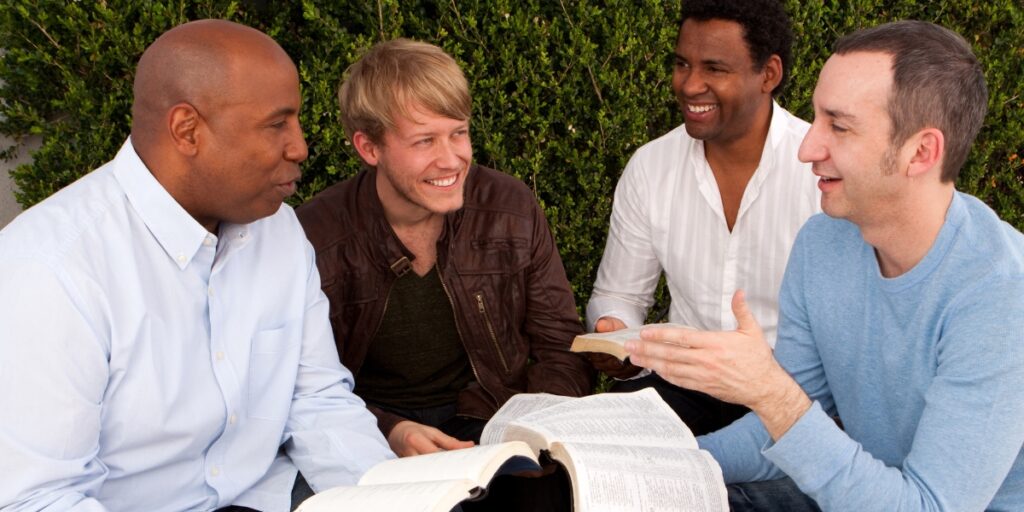What Is Celebrate Recovery?

What Is Celebrate Recovery?
Celebrate Recovery is a Christ-centered, Bible-inspired recovery program to help heal people struggling with hurts, habits, and hang-ups related to substance abuse and other challenging life circumstances.
John Baker, a member of Saddleback Church in Lake Forest, California, became inspired to form Celebrate Recovery after attending Alcoholics Anonymous (AA) to help with struggles with substance abuse. Baker felt a calling for a recovery program inspired by the eight teachings of Jesus Christ during his Sermon on the Mount, commonly known as the Beatitudes. Baker reached out to Pastor Rick Warren with his idea, and together they developed and refined the 12 steps of Celebrate Recovery.
What started as a small group of like-minded people in recovery now reaches roughly five million people worldwide through 37,000 participating churches, yearly summits, and faith-based outreach programs working to improve substance abuse recovery outcomes.
Celebrate Recovery 12 Steps
The Celebrate Recovery 12 steps each have a corresponding Bible verse based on the teachings of Jesus Christ.
The 12 steps of Celebrate Recovery and their supporting Bible verses are as follows:
- Step 1: Realize I’m not God, my life has become unmanageable, and I am powerless over my addiction and behaviors.
“I know that nothing good lives in me, that is, in my sinful nature.
For I have the desire to do what is good, but I cannot carry it out.” Romans 7:18 - Step 2: Earnestly believe that God exists, I matter to Him, and He holds the power to help me recover.
“For it is God who works in you to will and to act according to his good purpose.” Philippians 2:1 - Step 3: Consciously choose to commit my life to Jesus Christ’s care and control.
“Therefore, I urge you, brothers, in view of God’s mercy, to offer your bodies as living sacrifices, holy and pleasing to God – this is your spiritual act of worship.” Romans 12:1 - Step 4: Openly examine and admit my faults and take a fearless moral inventory.
“Let us examine our ways and test them, and let us return to the Lord.” Lamentations 3:40 - Step 5: Admit the nature of our wrongs and shortcomings to ourselves, God, and a trusted person.
“Therefore confess your sins to each other and pray for each other so that you may be healed.” James 5:16 - Step 6: I voluntarily submit to changes God wants me to make and prepare myself for Him to remove my flaws.
“Humble yourselves before the Lord, and he will lift you up.” James 4:10 - Step 7: I humbly asked Him to remove my character defects and shortcomings.
“If we confess our sins, he is faithful and will forgive us our sins and purify us from all unrighteousness.” 1 John 1:9 - Step 8: Evaluate who has hurt me and who I have hurt, and prepare myself to make amends.
“Do to others as you would have them do to you.” Luke 6:31 - Step 9: Offer forgiveness to those who’ve hurt me and make direct amends to those I’ve hurt unless doing so would bring them more harm.
“Therefore, if you are offering your gift at the altar and there, remember that your brother has something against you, leave your gift there in front of the altar. First, go and be reconciled to your brother; then come and offer your gift.” Matthew 5:23-24 - Step 10: Continue to take personal inventory and admit when I was wrong and acted ungodly.
“So, if you think you are standing firm, be careful that you don’t fall!” 1 Corinthians 10:1 - Step 11: Commit daily to commune and spend time with God and self-examine, read scripture, and pray to become more open to His will and gain the resolve to follow it.
“Let the word of Christ dwell in you richly.” Colossians 3:16 - Step 12: Yield myself to God and allow me to become a messenger of His will through my examples and actions to bring this good news to others.
“Brothers, if someone is caught in a sin, you who are spiritual should restore them gently. But watch yourself, or you also may be tempted.” Galatians 6:1
These Bible beliefs and teachings are the foundation of Celebrate Recovery, meaning that participants must recognize Jesus Christ as the only true Higher power. People do not have to belong to a church to participate in Celebrate Recovery; however, they must identify as Christan and are encouraged to find a church to attend regularly to help them adhere to the five recovery rules.

Celebrate Recovery vs. AA
The primary difference between Celebrate Recovery and Alcoholics Anonymous (AA) is accepting the Christ-centered focus. 12-step facilitation groups stipulate you must believe in a power greater than yourself, but it can be any deity or spiritual signifier you choose; Celebrate Recovery requires you to recognize Jesus Christ as the only higher power in existence.
The second difference is that Celebrate Recovery uses its model to heal all hurts, habits, and hang-ups holding people back, including mental health issues, sexual abuse, trauma, and other non-substance abuse-related problems. Secular or non-religious, twelve-step programs like AA center around substance abuse and related problems.
Celebrate Recovery Meetings
There are two types of Celebrate Recovery meetings, open-share and twelve-step-based. Celebrate Recovery meetings consist of small, gender-specific groups. Most participants will complete Celebrate Recovery 12-step models and attend open share meetings throughout their long-term recovery.
12-step Celebrate Recovery meetings follow a schedule and focus on one step at a time, requiring regular attendance. All Celebrate Recovery meetings include worship and bible study that is open share, allowing people to openly discuss whatever is on their mind, then accept advice and feedback from other group members. Open share meetings are held weekly and don’t require anything from members.

Celebrate Recovery in Northridge, California
As the principles of effective addiction treatment state, treatments should cater to the beliefs and needs of each person, including religion. Studies show that Christians who seek out and attend spirituality and faith-based recovery programs have high long-term recovery rates.
At Northridge Addiction Treatment Center, we proudly offer Celebrate Recovery meetings to our residents. We believe your faith is essential to your individualized treatment plan and supports meaningful, life-long recovery.
NATC’s private, serene residential treatment center offers comprehensive, evidence-based treatment and therapy programs in a nurturing, empowering environment surrounded by professional, experienced, and compassionate care.
Reach out to our treatment specialists today. We look forward to helping you get on your path to recovery.
Find Meaningful Recovery
Our caring and compassionate specialists are eager to help you comfortably navigate this journey to recovery. Our individualized treatment plan, programs, and therapies may be a perfect match for you or your loved one. Let us assist you in living the happy life you deserve. It starts with a phone call.




